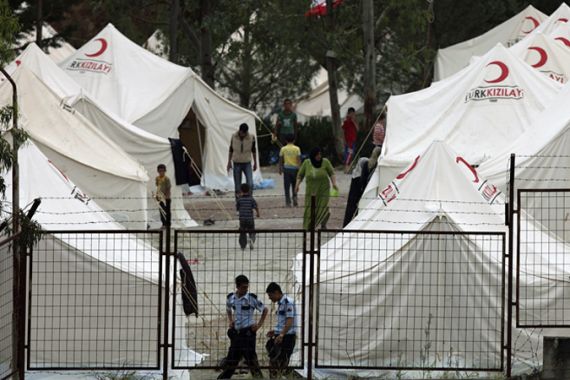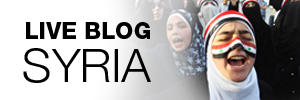Thousands of Syrians flee to Turkey
Turkish officials say at least 4,300 people escaping unrest have crossed the border, as Syrian army operations continue.

Thousands of Syrians have fled to Turkey to escape violence and more are sheltering near the border, officials say.
A senior Turkish diplomat said 4,300 Syrians had crossed the border as of Saturday morning and that Turkey was prepared for a further influx.
“Turkey welcomed a great many number of guests in the past in their times of most dire need. We can do that again,” Foreign Ministry Deputy Undersecretary Halit Cevik was quoted as saying by state-run Anatolian news agency.
Most of those fleeing come from the town of Jisr al-Shughur and nearby villages, where Syrian troops backed by tanks, helicopters and heavy armour have been operating for several days, trying to crush a nearly three-month anti-government uprising.
‘Sniper fire’
In the Turkish border town of Yayladagi, authorities set up four field hospitals, each with a 10-bed capacity, for emergency cases, the state-run Anatolia news agency said.
Most of the nearly 50 Syrians, who were wounded in clashes in Jisr al-Shughur or elsewhere recently, were being treated at the state hospital in the Turkish city of Hatay.
 |
One of them, who only identified himself with his first name, Ahmad, told an Associated Press reporter at his hospital bed on Saturday that he was hit by three bullets during a protest in Jisr al-Shughur last Saturday.
“The snipers suddenly started firing onto us from three buildings,” a Turkish relative quoted him as saying in Arabic. “I was hit in the neck and chest first but a third bullet found my right arm when I raised it while on the ground.”
On the Syrian side of the border, people camped in tents and huts among the area’s groves and orchards.
“Everybody is gone, there is no one left,” Talal, who settled with his family on a hill overlooking the Turkish border village of Guvecci, told the AFP news agency.
“We all came here, but if conditions worsen, we will cross into Turkey,” he said, speaking through the border fence.
The Turkish Red Crescent has started building more camps to the northeast of Yayladagi, in Altinozu and Boynuyogun, capable of holding 4,000 and 5,000 people respectively, in anticipation of more refugees to come as the conflict in Syria continues.
‘Humanitarian crisis’
The White House on Saturday accused the Syrian government of creating a humanitarian crisis and urged it to halt its crackdown on civilians and give the Red Cross immediate, unfettered access to the country’s northern region.
“Syrian leaders have no excuse for denying humanitarian assistance by a neutral body like the ICRC,” the White House said. “If Syria’s leaders fail to provide this access, they will once again be showing contempt for the dignity of the Syrian people.”
Turkey’s Prime Minister Recep Tayyip Erdogan has called the crackdown in Jisr al-Shughur “unacceptable” and pledged to keep the border open.
The Syrian crackdown on anti-government protests has drawn global condemnation, but Damascus on Friday rejected all criticism.
It warned the United Nations that a European draft resolution condemning the country for the crackdown would only embolden “extremists and terrorists”.
“It is important that the Security Council should not intervene in the internal affairs of Syria, which is a founding member of the United Nations,” Syrian Foreign Minister Walid al-Moualem told the UN Secretary-General Ban Ki-moon in a letter obtained by Reuters news agency.
“We are quite certain that any resolution that is adopted by that body under any heading will only exacerbate the situation and send a message to those extremists and terrorists to the effect that the deliberate destruction that they are wreaking has the support of the Security Council,” he said.
The Syrian response came as UN Security Council diplomats met in New York in another attempt to break their deadlock on a draft resolution that would not impose sanctions on Syria but would condemn it for the crackdown and suggest Syrian security forces might be guilty of crimes against humanity.
Al-Moualem offered no apology for the crackdown, which rights groups say has killed at least 1,300 civilians since March. He said Damascus had no choice but to press ahead to ensure “the security of the nation and the population”.
“We hope that the United Nations and its member states will assist Syria in confronting the challenges of extremism and terrorism and will not hastily adopt a position that will provide a cloak for the murderous, destructive gangs,” he said in the letter.